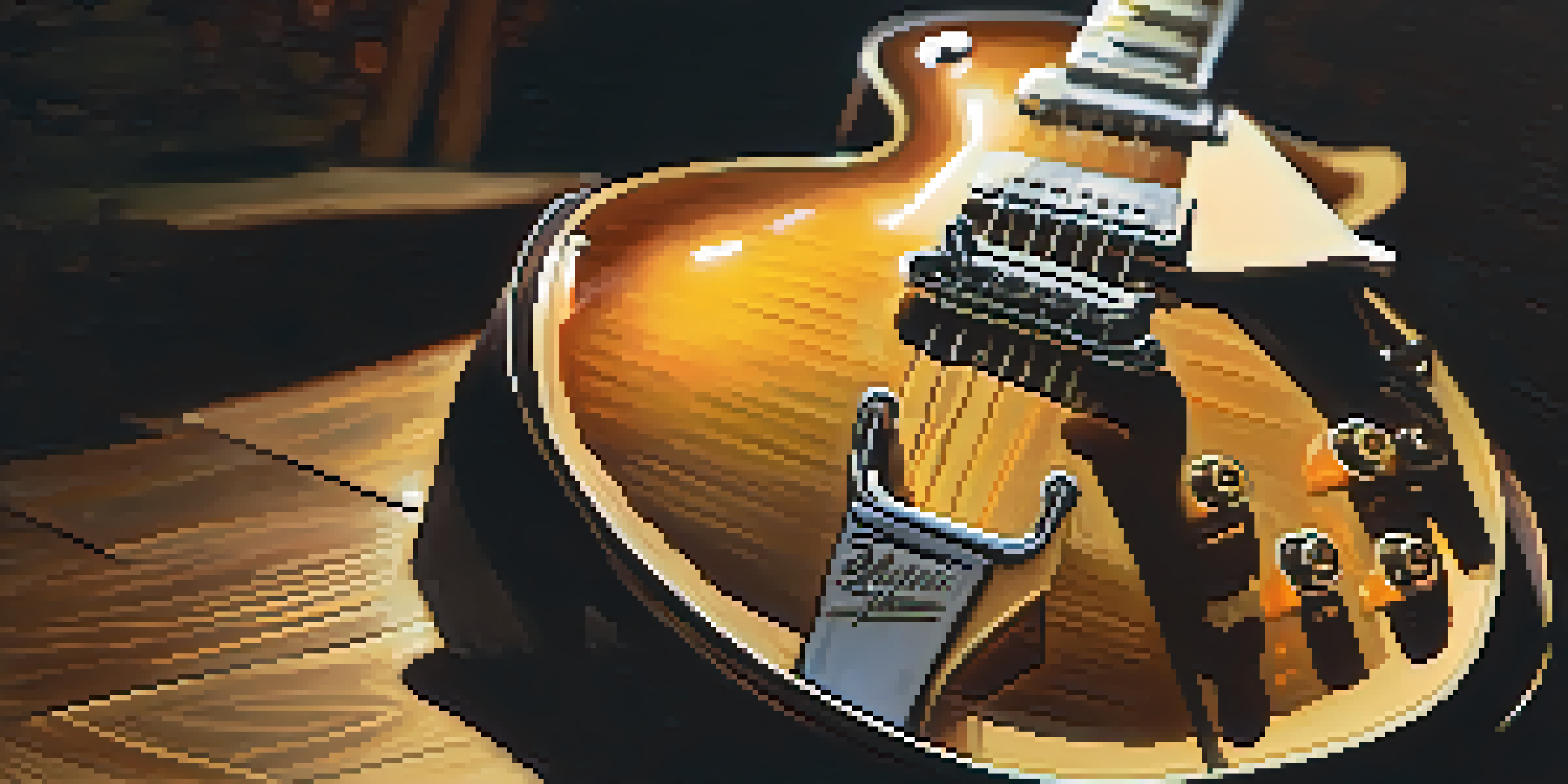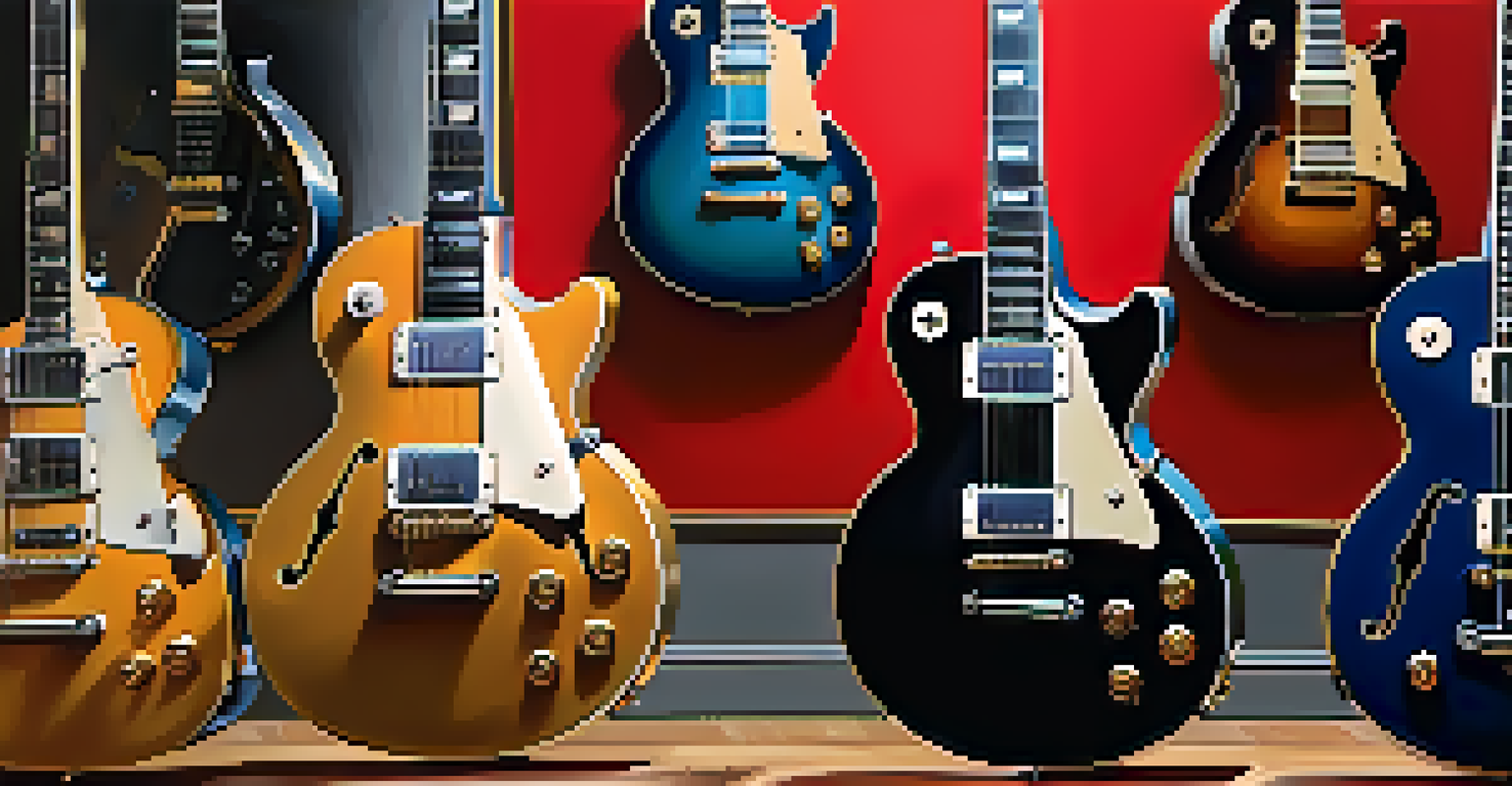The Legacy of Les Paul: Guitar Innovator and Music Pioneer

Les Paul: The Man Behind the Guitar Legend
Les Paul was not just a guitarist; he was a visionary who forever changed the landscape of music. Born in 1915, he began playing guitar at a young age, quickly falling in love with the instrument. His passion for innovation would lead him to create the iconic electric guitar that bears his name, forever altering the way music is produced and played.
The guitar is a small orchestra. It is a thousand different instruments at once.
He was a pioneer in blending different music genres, which brought a unique flair to his performances. With a blend of jazz, country, and pop, Les Paul created a sound that was unmistakably his, captivating audiences worldwide. His influence reached far beyond his performances, as he inspired countless musicians to think outside the box.
Through his relentless experimentation and desire to push the boundaries, Les Paul established himself as a true music innovator. His contributions laid the groundwork for many modern guitarists and musicians, making him a household name even decades after his passing.
The Birth of the Electric Guitar: A Game Changer
Les Paul’s invention of the electric guitar in the early 1940s was nothing short of revolutionary. He recognized that traditional acoustic guitars couldn't produce the volume needed for big band music, so he set out to create a solution. This resulted in the solid-body electric guitar, which allowed for greater amplification and sustain, changing the sound of music forever.

His collaboration with Gibson led to the creation of the Les Paul model, which became a favorite among rock musicians. Artists like Jimmy Page and Slash have used this guitar to create some of the most memorable riffs in history. The Les Paul guitar became synonymous with rock 'n' roll, further cementing his legacy as an innovator.
Les Paul: A Musical Innovator
Les Paul's passion for innovation transformed music through the invention of the electric guitar and the development of recording techniques.
The electric guitar's impact extends beyond just rock music; it has influenced genres ranging from blues to jazz to country. Les Paul’s design not only shaped the sound but also the playing techniques that define modern guitar playing today.
Innovations in Recording: The Overdub Technique
Les Paul was also a pioneer in recording technology, particularly with his development of overdubbing. This technique allowed musicians to layer multiple recordings on top of one another to create rich, complex sounds. By experimenting with tape recorders, he could capture his guitar solos and harmonies in ways previously unimaginable.
Innovation distinguishes between a leader and a follower.
The use of overdubbing transformed the recording process, enabling artists to build full arrangements without needing an entire band in the studio at once. This was a significant shift in how music was produced, making it easier for solo artists to create intricate compositions. Les Paul’s innovations paved the way for the modern recording industry.
Today, overdubbing is a standard practice in music production, showing just how far-reaching Les Paul's influence has been. His creative spirit in the studio set the stage for generations of musicians and producers to follow, highlighting the importance of innovation in the arts.
The Impact on Rock and Roll Culture
Les Paul's influence on rock and roll culture can’t be overstated. He inspired a generation of musicians who saw the electric guitar as a vehicle for creativity and self-expression. His unique sound and playing style became a template for countless artists, helping to shape the genre into what we recognize today.
Artists like Eric Clapton, Jeff Beck, and many others credit Les Paul as a major influence in their careers. His guitar solos and innovative techniques have permeated rock music, encouraging musicians to push their creative boundaries. This legacy continues to resonate in the music of today’s top performers.
Legacy in Rock and Roll Culture
His unique sound and pioneering techniques inspired generations of musicians, shaping the rock genre and establishing the Les Paul guitar as an icon.
The Les Paul guitar remains a symbol of rock culture, representing not just a musical instrument but also the spirit of rebellion and creativity. This connection to rock and roll highlights how one person's innovations can ripple through time, influencing countless others along the way.
A Lifelong Passion for Music and Innovation
Les Paul’s dedication to music and innovation didn’t wane with age; in fact, it only grew stronger. Even in his later years, he continued to perform and experiment with new sounds and techniques. His passion inspired many young musicians, proving that creativity knows no age limit.
He was known for his lively performances at the Iridium Jazz Club in New York, where he played well into his 90s. These shows were a testament to his love for music and his commitment to sharing that joy with others. His ability to connect with audiences through his artistry made him a beloved figure in the music community.
Les Paul's legacy is not just about the instruments he created or the music he played; it's about the spirit of innovation that he instilled in generations of musicians. His life serves as a reminder that creativity and passion can lead to lasting impact, encouraging others to pursue their artistic dreams.
Honors and Recognition: A Lasting Legacy
Throughout his life, Les Paul received numerous accolades for his contributions to music and technology. He was inducted into the Rock and Roll Hall of Fame in 1988, a recognition of his profound impact on the genre. Additionally, he received multiple Grammy Awards, highlighting his excellence in both performance and recording.
His influence continues to be celebrated today, with many guitarists and musicians citing him as a pivotal figure in their careers. Les Paul’s name is synonymous with quality and innovation, ensuring that his legacy lives on in every note played on his guitars. His contributions are not merely historical; they remain relevant in contemporary music.
Enduring Influence on Music Today
Decades after his passing, Les Paul's contributions to music production and guitar design continue to inspire artists across various genres.
Les Paul's legacy has inspired foundations and scholarships aimed at supporting young musicians, ensuring that his spirit of innovation continues. It’s a beautiful cycle: as new generations of artists are inspired, they carry forward the torch that Les Paul lit, perpetuating a culture of creativity and exploration.
The Enduring Influence of Les Paul Today
Even decades after his passing in 2009, Les Paul's influence is still felt in music around the world. Modern guitarists continue to draw inspiration from his techniques and innovations, making his contributions timeless. The Les Paul guitar remains a top choice for musicians across various genres, embodying the spirit of rock and roll.
Music production techniques introduced by Les Paul, like multi-tracking and overdubbing, are now standard practices in studios everywhere. These methods have paved the way for modern music production, highlighting his lasting impact on the industry. His work reminds us that innovation is crucial to artistic evolution.

Les Paul's legacy is not just about his inventions; it’s about the creativity and passion he instilled in countless musicians. As we listen to music today, we can still hear echoes of his influence, proving that true innovators never really fade away—they simply inspire the future.